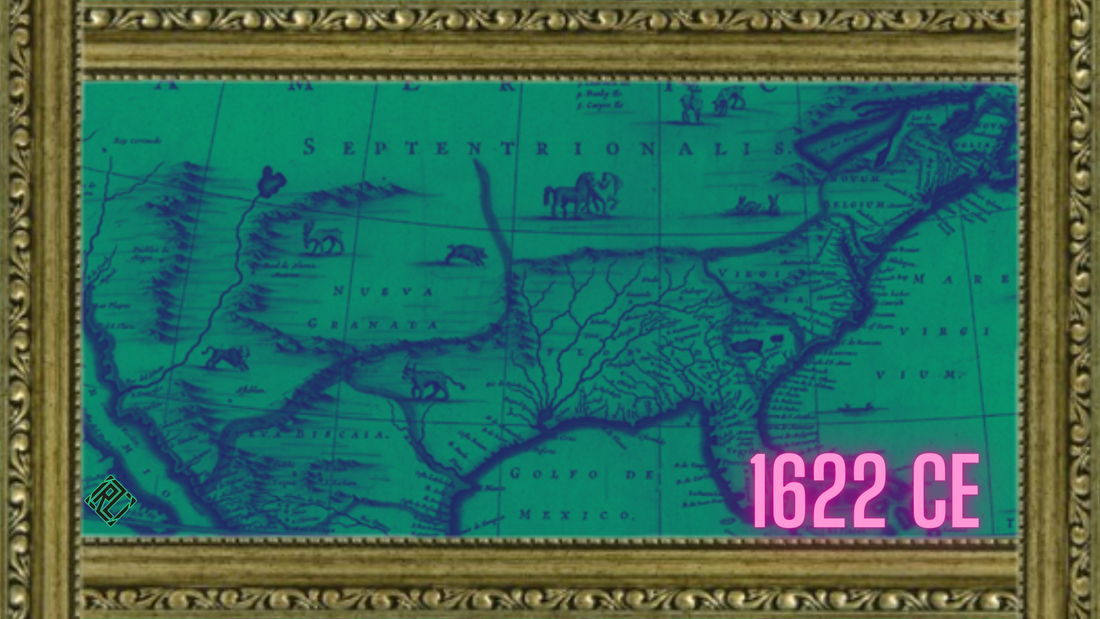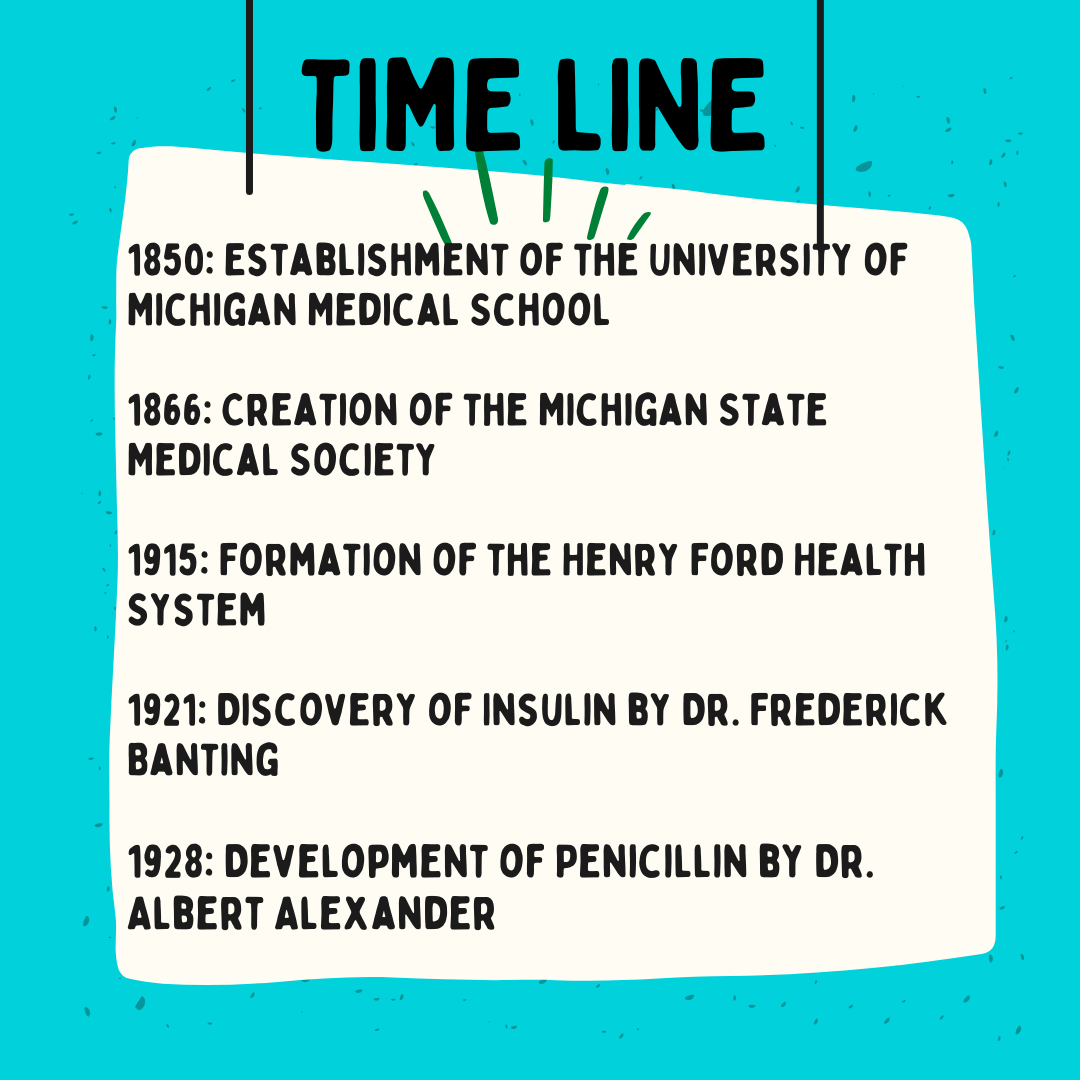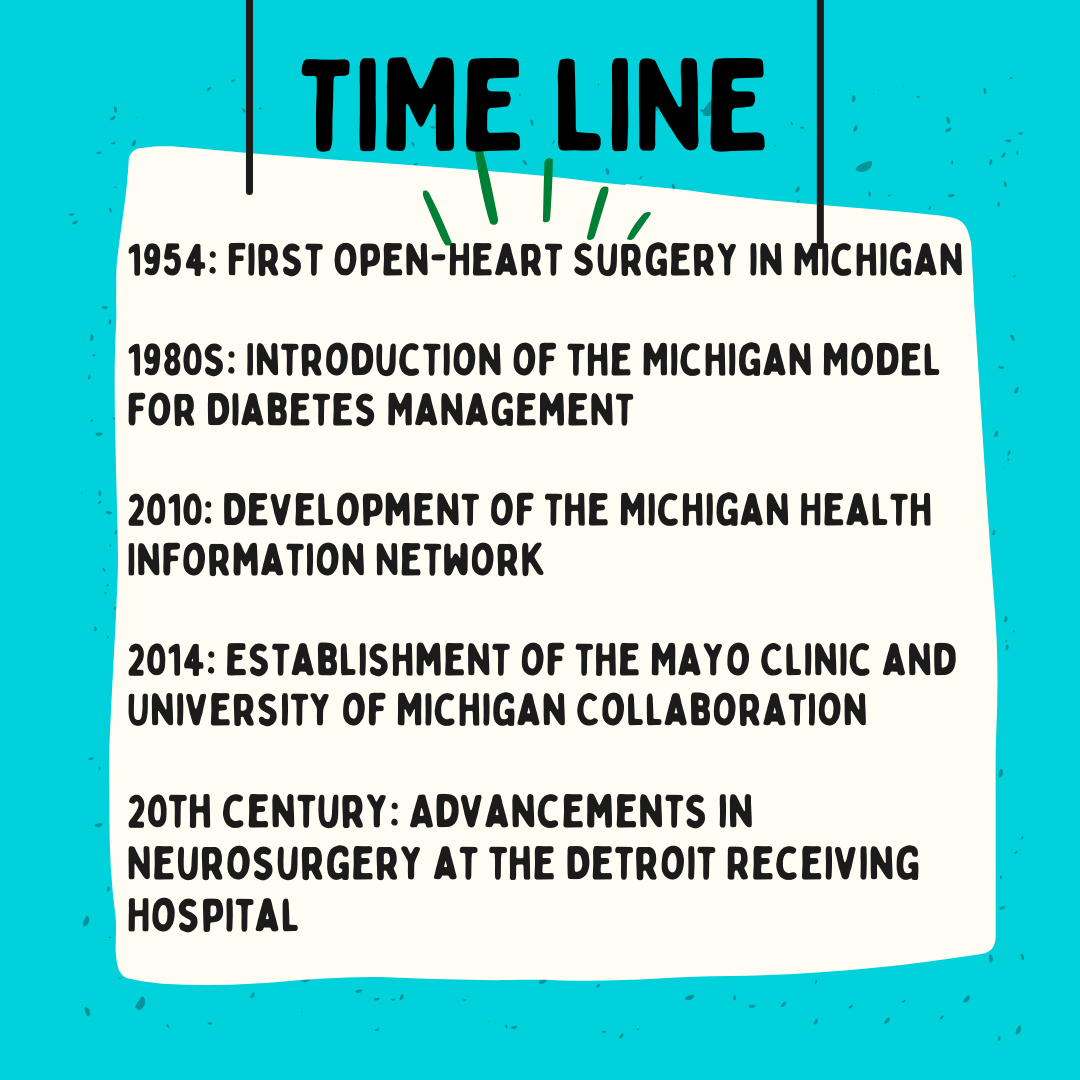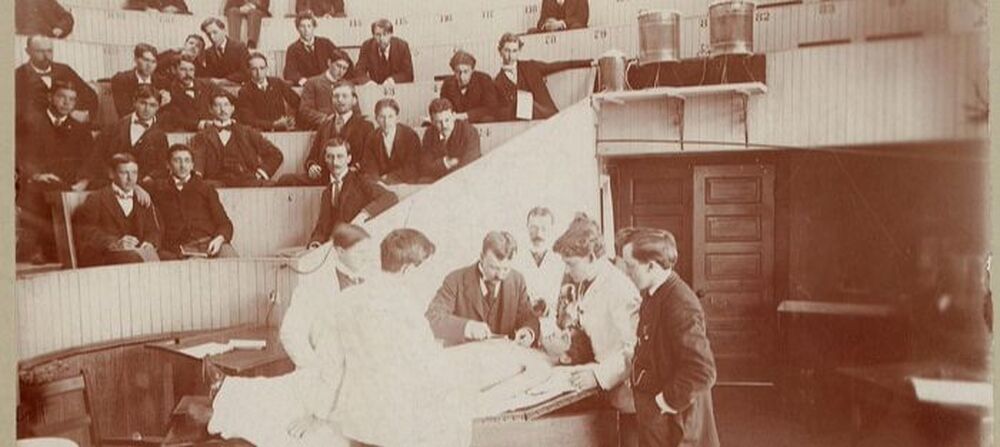Module Ten: Great Lakes & Great Aches
Michigan is the land of lakes, where cars reign supreme and socio-economic dramas unfold like a daytime soap opera. Let's take a joyride through its history, where science meets reality in a collision of epic proportions. Imagine a state with a story as wild as its weather. From the brainy folks at the University of Michigan's Medical School, it was educating geniuses forever, to Harper University Hospital, where hearts are dissected with more gusto than a Michigan apple at its ripest. Michigan's got a tale to tell, and it's not all sunshine and daisies.
Sure, they've gifted us with some medical marvels, and have you ever heard of MRI and CT scans? You can thank Michigan's auto industry for those. When you're done revolutionizing how we get around, why not dabble in saving lives, too? But buckle up because where there's progress, there's usually an excellent ol' controversy brewing. Take the Flint water fiasco, for instance. Someone thought switching up the drinking water was a grand idea, forgetting the essential anti-lead seasoning. Cue the health crises and the blame game. It's a classic Michigan move, isn't it?
And let's not overlook the biggie: the 1918 influenza pandemic. Michigan took a hit harder than a Ford F-150 in a hailstorm. Hospitals are overflowing, and resources are drying up. It sounds like a blast, right? At least they learned something about handwashing and keeping a stockpile of tissues. So why should we care about Michigan's medical mishaps? Well, for starters, it's a masterclass in how not to handle your drinking water. Plus, it's a reminder that despite pandemics and lead woes, there's a glimmer of hope. Like, you know, better public health policies and all.
Michigan's journey in science and medicine isn't just a snoozefest for history buffs. It's a cautionary tale, a testament to resilience, and a reminder that even in the darkest times, there's a spark of optimism.
THE RUNDOWN
QUESTIONS
Sure, they've gifted us with some medical marvels, and have you ever heard of MRI and CT scans? You can thank Michigan's auto industry for those. When you're done revolutionizing how we get around, why not dabble in saving lives, too? But buckle up because where there's progress, there's usually an excellent ol' controversy brewing. Take the Flint water fiasco, for instance. Someone thought switching up the drinking water was a grand idea, forgetting the essential anti-lead seasoning. Cue the health crises and the blame game. It's a classic Michigan move, isn't it?
And let's not overlook the biggie: the 1918 influenza pandemic. Michigan took a hit harder than a Ford F-150 in a hailstorm. Hospitals are overflowing, and resources are drying up. It sounds like a blast, right? At least they learned something about handwashing and keeping a stockpile of tissues. So why should we care about Michigan's medical mishaps? Well, for starters, it's a masterclass in how not to handle your drinking water. Plus, it's a reminder that despite pandemics and lead woes, there's a glimmer of hope. Like, you know, better public health policies and all.
Michigan's journey in science and medicine isn't just a snoozefest for history buffs. It's a cautionary tale, a testament to resilience, and a reminder that even in the darkest times, there's a spark of optimism.
THE RUNDOWN
- Michigan's pivotal role in healthcare advancements underscores its contribution to industry growth and development.
- The University of Michigan Medical School, established in 1850, has long been a leader in medical education and research.
- Noteworthy achievements, such as the first successful open-heart surgery in 1954 at Harper University Hospital, highlight Michigan's medical innovation.
- Michigan's automotive industry has revolutionized medical diagnostics with technologies like MRI and CT scans.
- Governance lessons, exemplified by the Flint water crisis, stress the importance of responsible policies in safeguarding public health.
- Michigan's proactive measures during the influenza pandemic demonstrate its commitment to improving public health readiness for future crises.
QUESTIONS
- When leaders make health rules, they need to think about what's best for everyone. What are some tough choices they have to make, especially after things like the Flint water problem? How can they make sure everyone is treated fairly?
- Sometimes, communities need to speak up to make sure everyone gets fair treatment in healthcare. How can communities make sure leaders listen to them and fix problems like not having clean water? What can people do to make sure everyone stays healthy?
- Schools and other places can teach us how to stay healthy. How can learning about health help us make better choices? What can schools do to teach us more about staying healthy?
#10 Remove the Term Un-American from Your Vocabulary
In the vast saga of American history, few threads are as tangled and unraveled as the notion of being "Un-American." It's akin to receiving that infamous ugly sweater from Aunt Edna—scratchy, awkwardly sized, and definitely not something you'd want to flaunt in public. But alas, here we are, grappling with the knotty conundrum of what it truly means to be labeled as "un-American." It's the 1950s, and McCarthyism is running amok. Senator Joseph McCarthy is charging about like a bull in a china shop, brandishing his "Un-American" stamp as if it were a mark of distinction. Sneeze the wrong way, and you'd find yourself adorned with that scarlet letter quicker than you could say "democracy." Lives were upended, and careers torpedoed, all in the pursuit of sniffing out supposed commies as if they were hiding in every mom-and-pop store.
But let's rewind to the early 1900s and spare a thought for our immigrant pals from southern and eastern Europe. They were greeted with all the warmth of a skunk crashing a garden party, their customs and tongues deemed too exotic for the American taste buds. Suddenly, being "Un-American" meant having a surname with too many syllables or speaking a language that wasn't butchered English. Now, let's not overlook the silver lining amid this cloud of "Un-American" madness. Consider the civil rights movement – a bunch of folks boldly declaring, "Maybe segregating based on skin color isn't quite the American dream." Leaders like MLK Jr. were stirring the pot, challenging the norm like a rusty vending machine refusing to cough up change.
But here's the twist: we're still dancing to the same old tune in the 21st century. Just ask the LGBTQ community about being branded as "Un-American." It's like déjà vu but with a better fashion sense and a killer playlist. They're out there, fighting tooth and nail for the fundamental right to exist without being slapped with some outdated, discriminatory tag. So, what's the moral of this topsy-turvy tale? Well, it's time we stopped playing Pin the Tail on the Donkey with labels. Instead of fixating on our differences, it's time to celebrate the messy, glorious diversity that makes America a melting pot worth savoring. After all, nobody enjoys a burnt bottom, especially not in this grand tapestry we call home.
RUNDOWN
STATE OF THE STATE
But let's rewind to the early 1900s and spare a thought for our immigrant pals from southern and eastern Europe. They were greeted with all the warmth of a skunk crashing a garden party, their customs and tongues deemed too exotic for the American taste buds. Suddenly, being "Un-American" meant having a surname with too many syllables or speaking a language that wasn't butchered English. Now, let's not overlook the silver lining amid this cloud of "Un-American" madness. Consider the civil rights movement – a bunch of folks boldly declaring, "Maybe segregating based on skin color isn't quite the American dream." Leaders like MLK Jr. were stirring the pot, challenging the norm like a rusty vending machine refusing to cough up change.
But here's the twist: we're still dancing to the same old tune in the 21st century. Just ask the LGBTQ community about being branded as "Un-American." It's like déjà vu but with a better fashion sense and a killer playlist. They're out there, fighting tooth and nail for the fundamental right to exist without being slapped with some outdated, discriminatory tag. So, what's the moral of this topsy-turvy tale? Well, it's time we stopped playing Pin the Tail on the Donkey with labels. Instead of fixating on our differences, it's time to celebrate the messy, glorious diversity that makes America a melting pot worth savoring. After all, nobody enjoys a burnt bottom, especially not in this grand tapestry we call home.
RUNDOWN
- The historical concept of being "Un-American" is akin to an unsightly, ill-fitting garment, fraught with discomfort and social stigma.
- Throughout history, individuals and communities have been unfairly labeled as "Un-American," often leading to profound consequences such as ruined lives and shattered careers.
- Examples from McCarthyism in the 1950s to the discrimination faced by immigrants in the early 1900s highlight the pervasive nature of this label across different eras.
- However, movements like the civil rights struggle and advocacy for LGBTQ rights demonstrate resilience against such discriminatory categorizations.
- Despite progress, the 21st century still witnesses instances where individuals, particularly from marginalized groups, are unfairly branded as "Un-American."
- Embracing diversity and challenging the imposition of divisive labels can foster a more inclusive and equitable society.
STATE OF THE STATE
HIGHLIGHTS
We've got some fine classroom lectures coming your way, all courtesy of the RPTM podcast. These lectures will take you on a wild ride through history, exploring everything from ancient civilizations and epic battles to scientific breakthroughs and artistic revolutions. The podcast will guide you through each lecture with its no-nonsense, straight-talking style, using various sources to give you the lowdown on each topic. You won't find any fancy-pants jargon or convoluted theories here, just plain and straightforward explanations anyone can understand. So sit back and prepare to soak up some knowledge.
LECTURES
LECTURES
- UNDER CONSTRUCTION!
READING
This class utilizes the following textbook:
Hathaway, Richard J. Michigan Visions of Our Past. United States Of America: Michigan State University Press, 1989.
"Michigan: Visions of Our Past" is an exhilarating adventure through the state's eventful history, led by scholars like Hathaway wielding the tools of the past. This collection reads like a diverse assortment of exciting stories and surprising revelations, providing a non-linear exploration of Michigan's struggle with its identity – be it navigating labor disputes, economic ups and downs, or the enduring conflict between religion and education. The book, resembling more of a mind-bending trip than a traditional history lesson, reflects Michigan's tumultuous history, encouraging readers to recognize that history is not merely a forgotten tome but a guidebook for the state's uncertain future. In this unconventional narrative, Michigan's history unfolds as a disorderly, absurd spectacle – a turbulent, unpredictable journey that embraces idiosyncrasies, confronts challenges, and invites everyone to the lively celebration of the past.
- Hathaway Chapter Six: A Better Lifer for All - Political and Social Reform in Michigan, 1890 - 1919"
This class utilizes the following textbook:
Hathaway, Richard J. Michigan Visions of Our Past. United States Of America: Michigan State University Press, 1989.
"Michigan: Visions of Our Past" is an exhilarating adventure through the state's eventful history, led by scholars like Hathaway wielding the tools of the past. This collection reads like a diverse assortment of exciting stories and surprising revelations, providing a non-linear exploration of Michigan's struggle with its identity – be it navigating labor disputes, economic ups and downs, or the enduring conflict between religion and education. The book, resembling more of a mind-bending trip than a traditional history lesson, reflects Michigan's tumultuous history, encouraging readers to recognize that history is not merely a forgotten tome but a guidebook for the state's uncertain future. In this unconventional narrative, Michigan's history unfolds as a disorderly, absurd spectacle – a turbulent, unpredictable journey that embraces idiosyncrasies, confronts challenges, and invites everyone to the lively celebration of the past.
Howard Zinn was a historian, writer, and political activist known for his critical analysis of American history. He is particularly well-known for his counter-narrative to traditional American history accounts and highlights marginalized groups' experiences and perspectives. Zinn's work is often associated with social history and is known for his Marxist and socialist views. Larry Schweikart is also a historian, but his work and perspective are often considered more conservative. Schweikart's work is often associated with military history, and he is known for his support of free-market economics and limited government. Overall, Zinn and Schweikart have different perspectives on various historical issues and events and may interpret historical events and phenomena differently. Occasionally, we will also look at Thaddeus Russell, a historian, author, and academic. Russell has written extensively on the history of social and cultural change, and his work focuses on how marginalized and oppressed groups have challenged and transformed mainstream culture. Russell is known for his unconventional and controversial ideas, and his work has been praised for its originality and provocative nature.
My classes utilize both Howard Zinn's A People's History of the United States and Larry Schweikart's Patriot's History of the United States, mostly in excerpts posted to the modules.
My classes utilize both Howard Zinn's A People's History of the United States and Larry Schweikart's Patriot's History of the United States, mostly in excerpts posted to the modules.

Zinn, A People's History of the United States
"... In an even more flagrant violation of the principle of free trade, the United States would not allow shipments of food or medicine to Iraq or to Cuba, the result being the deaths of tens of thousands of children. In 1996, on the television program 60 Minutes, U.S. Ambassador to the United Nations Madeleine Albright was asked about the report that "a half million children have died as a result of sanctions against Iraq.... That is more children than died in Hiroshima.... Is the price worth it?" Albright replied: "I think this is a very hard choice, but
the price, we think the price is worth it."
The United States, with 5 percent of the earth's population, consumed 30 percent of what was produced worldwide. But only a tiny portion of the American population benefited; this richest 1 percent of the population saw its wealth increase enormously starting in the late 1970s. As a result of changes in the tax structure, by 1995 that richest 1 percent had gained over a trillion dollars and now owned over 40 percent of the nation's wealth..."
"... In an even more flagrant violation of the principle of free trade, the United States would not allow shipments of food or medicine to Iraq or to Cuba, the result being the deaths of tens of thousands of children. In 1996, on the television program 60 Minutes, U.S. Ambassador to the United Nations Madeleine Albright was asked about the report that "a half million children have died as a result of sanctions against Iraq.... That is more children than died in Hiroshima.... Is the price worth it?" Albright replied: "I think this is a very hard choice, but
the price, we think the price is worth it."
The United States, with 5 percent of the earth's population, consumed 30 percent of what was produced worldwide. But only a tiny portion of the American population benefited; this richest 1 percent of the population saw its wealth increase enormously starting in the late 1970s. As a result of changes in the tax structure, by 1995 that richest 1 percent had gained over a trillion dollars and now owned over 40 percent of the nation's wealth..."

Larry Schweikart, A Patriot's History of the United States
"...Colonials relied on folk medicine and Indian cures, including herbs, teas, honey, bark, and roots, supplemented with store-bought medicines. Doctors were few and far between. The American colonies had no medical school until the eve of the American Revolution, and veterinarians usually doubled as the town doctor, or vice versa. Into the vacuum of this absence of professional doctors stepped folk healers and midwives, “bone crackers” and bleeders. Going to a physician was usually the absolute last resort, since without anesthesia, any serious procedures would involve excruciating pain and extensive recovery. Women, especially, suffered during childbirth, and infants often had such high mortality rates that babies were not named until age two. Instead, mothers and fathers referred to the child as “the little visitor” or even “it.” Despite the reality of this difficult life, it is worth noting that by 1774 American colonists already had attained a standard of living that far surpassed that found in most of the civilized parts of the modern world..."
"...Colonials relied on folk medicine and Indian cures, including herbs, teas, honey, bark, and roots, supplemented with store-bought medicines. Doctors were few and far between. The American colonies had no medical school until the eve of the American Revolution, and veterinarians usually doubled as the town doctor, or vice versa. Into the vacuum of this absence of professional doctors stepped folk healers and midwives, “bone crackers” and bleeders. Going to a physician was usually the absolute last resort, since without anesthesia, any serious procedures would involve excruciating pain and extensive recovery. Women, especially, suffered during childbirth, and infants often had such high mortality rates that babies were not named until age two. Instead, mothers and fathers referred to the child as “the little visitor” or even “it.” Despite the reality of this difficult life, it is worth noting that by 1774 American colonists already had attained a standard of living that far surpassed that found in most of the civilized parts of the modern world..."

Thaddeus Russell, A Renegade History of the United States
"...Revolutionary leaders believed—rightly—that sexual desire was an even greater threat than drunkenness to the new nation of self-regulating men. This was why, according to Jefferson, any American should be discouraged from visiting Europe, where 'he is led by the strongest of all the human passions, into a spirit for female intrigue, destructive of his own and others’ happiness, or a passion for whores, destructive of his health, and, in both cases, learns to consider fidelity to the marriage bed as an ungentlemanly practice, and inconsistent with happiness.' Benjamin Rush best explained why America had to attack sensual pleasure. For much of his career, Rush wrote and spoke about the inherent conflict between sexuality and a republic of 'free' men. In 1788 he wrote that the pleasure culture in the cities had a “pernicious influence upon morals, and thereby prepare our country for misery and slavery...'"
"...Revolutionary leaders believed—rightly—that sexual desire was an even greater threat than drunkenness to the new nation of self-regulating men. This was why, according to Jefferson, any American should be discouraged from visiting Europe, where 'he is led by the strongest of all the human passions, into a spirit for female intrigue, destructive of his own and others’ happiness, or a passion for whores, destructive of his health, and, in both cases, learns to consider fidelity to the marriage bed as an ungentlemanly practice, and inconsistent with happiness.' Benjamin Rush best explained why America had to attack sensual pleasure. For much of his career, Rush wrote and spoke about the inherent conflict between sexuality and a republic of 'free' men. In 1788 he wrote that the pleasure culture in the cities had a “pernicious influence upon morals, and thereby prepare our country for misery and slavery...'"
Michigan, where lakes, cars, and a healthcare system that's seen more ups and downs than a yo-yo in a windstorm reign supreme. Buckle up, folks, because we're about to take a topsy-turvy trip through the Great Lakes State medical annals—a saga filled with resilience, eyebrow-raising decisions, and the occasional lead-infused tap water.
Picture this: colonial times, when healthcare resembled a chaotic saloon brawl of home remedies and midwifery. Anesthesia? Ha! It was more like bite-down-on-a-stick-and-hope-for-the-best. Yet, despite the shortage of medical know-how and the surplus of bloodsucking leeches, colonists somehow managed to thrive, leaving us modern folks green with envy. Ah, the American spirit—making lemonade out of lemons and calling it a day.
But wait, there's more! Cue the Revolutionary era, with the Founding Fathers and their quaint obsessions with all things puritanical. Thomas Jefferson was busy sounding the alarm about European debauchery, while Benjamin Rush was convinced that too much fun would tear the nation apart quicker than you could say, "Don't tread on me." Ah, those were the days—when smallpox ran wild and suppressed desires ran even wilder. Zoom ahead to the late 20th century, and Uncle Sam decides to play doctor by slapping sanctions on Iraq and Cuba. Sure, it's all political posturing, but who knew that withholding medicine could put such a damper on thousands of innocent lives? Meanwhile, back at the ranch, the tax system is doing its best impression of Robin Hood in reverse, showering the top 1 percent with riches faster than you can say "money talks." And surprise, surprise—it turns out extreme wealth disparity isn't exactly a recipe for good health.
Now, why should you care about Michigan's medical misadventures of yore? Well, for starters, it's a crash course in resilience, showcasing how communities have braved storms of idiocy and emerged stronger. Plus, it's a stark reminder that debates about freedom and morality aren't just relics of the past—they're alive and kicking today, fueled by conflicting desires and good ol' fashioned guilt. Let's not overlook the Flint water fiasco—a modern-day debacle that's equal parts bureaucratic blunder and lead-induced nightmare. Nothing screams "public health crisis," like switching a city's water supply to save a few bucks and poisoning a whole generation. Classic Michigan move—always finding inventive ways to shoot oneself in the foot.
As we wrap up this rollercoaster ride through Michigan's medical mayhem, remember: history may have a knack for repeating itself, but that doesn't mean we're doomed to make the same old blunders. Let's learn from the past, folks, because the future is looking dicey enough as it is.
THE RUNDOWN
QUESTIONS
Picture this: colonial times, when healthcare resembled a chaotic saloon brawl of home remedies and midwifery. Anesthesia? Ha! It was more like bite-down-on-a-stick-and-hope-for-the-best. Yet, despite the shortage of medical know-how and the surplus of bloodsucking leeches, colonists somehow managed to thrive, leaving us modern folks green with envy. Ah, the American spirit—making lemonade out of lemons and calling it a day.
But wait, there's more! Cue the Revolutionary era, with the Founding Fathers and their quaint obsessions with all things puritanical. Thomas Jefferson was busy sounding the alarm about European debauchery, while Benjamin Rush was convinced that too much fun would tear the nation apart quicker than you could say, "Don't tread on me." Ah, those were the days—when smallpox ran wild and suppressed desires ran even wilder. Zoom ahead to the late 20th century, and Uncle Sam decides to play doctor by slapping sanctions on Iraq and Cuba. Sure, it's all political posturing, but who knew that withholding medicine could put such a damper on thousands of innocent lives? Meanwhile, back at the ranch, the tax system is doing its best impression of Robin Hood in reverse, showering the top 1 percent with riches faster than you can say "money talks." And surprise, surprise—it turns out extreme wealth disparity isn't exactly a recipe for good health.
Now, why should you care about Michigan's medical misadventures of yore? Well, for starters, it's a crash course in resilience, showcasing how communities have braved storms of idiocy and emerged stronger. Plus, it's a stark reminder that debates about freedom and morality aren't just relics of the past—they're alive and kicking today, fueled by conflicting desires and good ol' fashioned guilt. Let's not overlook the Flint water fiasco—a modern-day debacle that's equal parts bureaucratic blunder and lead-induced nightmare. Nothing screams "public health crisis," like switching a city's water supply to save a few bucks and poisoning a whole generation. Classic Michigan move—always finding inventive ways to shoot oneself in the foot.
As we wrap up this rollercoaster ride through Michigan's medical mayhem, remember: history may have a knack for repeating itself, but that doesn't mean we're doomed to make the same old blunders. Let's learn from the past, folks, because the future is looking dicey enough as it is.
THE RUNDOWN
- Michigan, renowned for its lakes, cars, and a healthcare system with more ups and downs than a rollercoaster, invites you on a topsy-turvy journey through its medical history, featuring resilience, questionable decisions, and lead-laced water supplies.
- Colonial times painted a wild west of healthcare, relying on folk remedies and midwives, where anesthesia was a stick to bite on, yet colonists somehow thrived, showcasing the American spirit of making do with what they had.
- The Revolutionary era brought Founding Fathers warning against European sensuality and puritanical paranoia about pleasure, navigating a landscape where smallpox and repressed desires ran rampant.
- In the late 20th century, Uncle Sam played doctor with global sanctions, inadvertently dampening innocent lives while a reverse Robin Hood tax structure fueled wealth disparity, proving detrimental to public health.
- Michigan's medical mishaps offer a lesson in resilience, demonstrating communities weathering storms of stupidity, as debates about freedom and morality persist, fueled by conflicting desires and puritanical guilt.
- Notably, the Flint water crisis symbolizes modern bureaucratic bumbling, epitomizing lead poisoning and Michigan's knack for finding innovative ways to shoot itself in the foot, urging us to learn from the past for an uncertain future.
QUESTIONS
- Thinking about the tough times Michigan's healthcare has had in the past, what can we learn from how things were back in colonial times and during the Revolutionary era that still matters today?
- How did political choices, like putting sanctions on countries such as Iraq and Cuba, affect healthcare not just in Michigan but across the whole country? How can we handle when politics and public health clash in a better way?
- The Flint water crisis shows us how serious it is when officials mess up and try to save money in ways that hurt people's health. How can we make sure these kinds of disasters don't happen again? What can regular people do to make sure leaders are doing their jobs right?
Prepare to be transported into the captivating realm of historical films and videos. Brace yourselves for a mind-bending odyssey through time as we embark on a cinematic expedition. Within these flickering frames, the past morphs into a vivid tapestry of triumphs, tragedies, and transformative moments that have shaped the very fabric of our existence. We shall immerse ourselves in a whirlwind of visual narratives, dissecting the nuances of artistic interpretations, examining the storytelling techniques, and voraciously devouring historical accuracy with the ferocity of a time-traveling historian. So strap in, hold tight, and prepare to have your perception of history forever shattered by the mesmerizing lens of the camera.
THE RUNDOWN
In the dimly lit corridors of the University of Michigan Hospital, an eclectic group of medical professionals congregates amidst the pervasive scent of antiseptic and existential unease. Picture this: doctors, nurses, and students navigating the complex maze of sickness and bureaucracy, grappling with the weight of history and the absurdity of human existence. Here, in this surreal setting where fluorescent lights flicker and life-support machines beep incessantly, we're swept into a narrative as old as the institution itself, dating back to its founding in 1869.
Fast forward through debates over the hospital's location and milestones, like the admission of women into medical education, and you'll find a medical monolith evolving with the times. Technological advancements, specialized fields, and bureaucratic hurdles abound, all while Medicare and Medicaid play their roles in the drama of public healthcare. Yet, amidst the chaos, a glimmer of humanity is buried beneath layers of paperwork and institutional norms, waiting to be unearthed like a hidden gem.
In the dimly lit corridors of the University of Michigan Hospital, an eclectic group of medical professionals congregates amidst the pervasive scent of antiseptic and existential unease. Picture this: doctors, nurses, and students navigating the complex maze of sickness and bureaucracy, grappling with the weight of history and the absurdity of human existence. Here, in this surreal setting where fluorescent lights flicker and life-support machines beep incessantly, we're swept into a narrative as old as the institution itself, dating back to its founding in 1869.
Fast forward through debates over the hospital's location and milestones, like the admission of women into medical education, and you'll find a medical monolith evolving with the times. Technological advancements, specialized fields, and bureaucratic hurdles abound, all while Medicare and Medicaid play their roles in the drama of public healthcare. Yet, amidst the chaos, a glimmer of humanity is buried beneath layers of paperwork and institutional norms, waiting to be unearthed like a hidden gem.
Welcome to the mind-bending Key Terms extravaganza of our history class learning module. Brace yourselves; we will unravel the cryptic codes, secret handshakes, and linguistic labyrinths that make up the twisted tapestry of historical knowledge. These key terms are the Rosetta Stones of our academic journey, the skeleton keys to unlocking the enigmatic doors of comprehension. They're like historical Swiss Army knives, equipped with blades of definition and corkscrews of contextual examples, ready to pierce through the fog of confusion and liberate your intellectual curiosity. By harnessing the power of these mighty key terms, you'll possess the superhuman ability to traverse the treacherous terrains of primary sources, surf the tumultuous waves of academic texts, and engage in epic battles of historical debate. The past awaits, and the key terms are keys to unlocking its dazzling secrets.
KEY TERMS
KEY TERMS
- 1622 - European Diseases in Michigan
- 1832- Cholera Epidemic in Michigan
- 1836 - Unfulled Healthcare and the Treaty of Washington
- 1845 - Detroit's Black-Owned Hospitals
- 1850 - University of Michigan Medical School
- 1873 - Michigan Department of Health and Human Services
- 1938- Blue Cross Blue Shield of Michigan
- 1941 - Michigan Oncology
- 1941 - World War II and Medical Advancements in Michigan
- 1951 - NAACP v. Detroit General Hospital
- 1954 - Salk Polio Vaccine Trials in Michigan
- 1965 - Medicare and Medicaid Implementation in Michigan
- 1967 - Michigan's Transplant Medicine
- 1978 - Lead Poisoning in Detroit
- 1984 - HIV/AIDS in Michigan
- 1999 - Michigan Life Sciences Corridor
- 2010 - Obamacare in Michigan
- 2010 - Michigan's Smoking Ban
- 2014- Flint Water Crisis and Public health
- 2020 - Public Health Response to COVID-19 in Michigan
DISCLAIMER: Welcome scholars to the wild and wacky world of history class. This isn't your granddaddy's boring ol' lecture, baby. We will take a trip through time, which will be one wild ride. I know some of you are in a brick-and-mortar setting, while others are in the vast digital wasteland. But fear not; we're all in this together. Online students might miss out on some in-person interaction, but you can still join in on the fun. This little shindig aims to get you all engaged with the course material and understand how past societies have shaped the world we know today. We'll talk about revolutions, wars, and other crazy stuff. So get ready, kids, because it's going to be one heck of a trip. And for all, you online students out there, don't be shy. Please share your thoughts and ideas with the rest of us. The Professor will do his best to give everyone an equal opportunity to learn, so don't hold back. So, let's do this thing!
Activity #1: UNDER CONSTRUCTION
Activity #2: UNDER CONSTRUCTION
Activity #1: UNDER CONSTRUCTION
Activity #2: UNDER CONSTRUCTION
Ladies and gentlemen, gather 'round for the pièce de résistance of this classroom module - the summary section. As we embark on this tantalizing journey, we'll savor the exquisite flavors of knowledge, highlighting the fundamental ingredients and spices that have seasoned our minds throughout these captivating lessons. Prepare to indulge in a savory recap that will leave your intellectual taste buds tingling, serving as a passport to further enlightenment.
In the convoluted labyrinth of American healthcare, Michigan's saga is a testament to victories and missteps, a tale woven with strands of perseverance, folly, and the occasional sprinkle of sheer lunacy. Imagine a realm where doctors were scarcer than unicorns at a rodeo, and home remedies ruled the day like a traveling circus of snake oil salespeople. In yore's rough and tumble days, communities relied on sheer grit and perhaps a hint of superstition to fend off the Grim Reaper. It was an era when a spoonful of sugar wasn't just medicine but the entire pharmacy.
But let's skip ahead a bit to the time of McCarthyism, when Joseph McCarthy brandished the "Un-American" label like a cudgel, striking down anyone who dared to tiptoe near the fiery coals of dissent. The aftermath felt like a hangover from a potent cocktail of paranoia and power trips, leaving behind a bitter aftertaste of injustice and a ringing in the ears of those who dared to speak out. And then there's the Flint water debacle, a modern-day calamity straight out of a dystopian nightmare. Political maneuvers turned tap water into a toxic cocktail, a cruel prank played on the most vulnerable among us. It's the sort of absurdity that makes you wonder if we're living in some twisted sitcom scripted by a malevolent deity with a warped sense of humor.
But amidst the chaos and catastrophe, there are glimmers of optimism, like lighthouses cutting through the fog of despair. Medical advancements and responses to pandemics highlight Michigan's resilience, reminding us that even in the darkest hours, some refuse to be crushed beneath the weight of history. So, what's the moral of the story? Life is likely messy, unpredictable, and frequently downright surreal. Yet through it all, we hold onto hope, resilience, and the notion that we can glean lessons from the blunders of the past and shape a brighter tomorrow. Or perhaps I've just OD'd on caffeine and need a break from my literary stylings.
Or, in other words:
But let's skip ahead a bit to the time of McCarthyism, when Joseph McCarthy brandished the "Un-American" label like a cudgel, striking down anyone who dared to tiptoe near the fiery coals of dissent. The aftermath felt like a hangover from a potent cocktail of paranoia and power trips, leaving behind a bitter aftertaste of injustice and a ringing in the ears of those who dared to speak out. And then there's the Flint water debacle, a modern-day calamity straight out of a dystopian nightmare. Political maneuvers turned tap water into a toxic cocktail, a cruel prank played on the most vulnerable among us. It's the sort of absurdity that makes you wonder if we're living in some twisted sitcom scripted by a malevolent deity with a warped sense of humor.
But amidst the chaos and catastrophe, there are glimmers of optimism, like lighthouses cutting through the fog of despair. Medical advancements and responses to pandemics highlight Michigan's resilience, reminding us that even in the darkest hours, some refuse to be crushed beneath the weight of history. So, what's the moral of the story? Life is likely messy, unpredictable, and frequently downright surreal. Yet through it all, we hold onto hope, resilience, and the notion that we can glean lessons from the blunders of the past and shape a brighter tomorrow. Or perhaps I've just OD'd on caffeine and need a break from my literary stylings.
Or, in other words:
- In the intricate tapestry of American healthcare, Michigan's narrative encapsulates triumphs, follies, and occasional absurdities.
- Picture a time when doctors were as rare as honest politicians, and folk medicine reigned supreme.
- Fast forward to the era of McCarthyism, where dissent was squashed with the "Un-American" label, leaving bitterness and injustice in its wake.
- Then there's the modern-day tragedy of the Flint water crisis, turning tap water into a toxic brew, a cruel joke on the vulnerable.
- Despite the chaos, Michigan shines with resilience, seen in medical breakthroughs and pandemic responses.
- Through the messiness of life, Michigan remains a complex and contradictory state, yet resilient and hopeful in forging a better future.
ASSIGNMENTS
Remember all assignments, tests and quizzes must be submitted official via BLACKBOARD
Forum Discussion #11
- Forum Discussion #11
Remember all assignments, tests and quizzes must be submitted official via BLACKBOARD
Forum Discussion #11
The University of Michigan is a renowned public research university known for its academic excellence, diverse student body, and vibrant campus culture. Watch the following video:
Please answer the following question:
Discuss how the institution's growth and evolution reflect changes in healthcare over time. Consider how advancements in technology and changes in patient care have influenced Michigan Medicine's development from its humble beginnings to its current status as a leading healthcare provider.
Need help? Remember the Discussion Board Rubric.
THE RUNDOWN
Michigan Medicine, rising like a phoenix from Ann Arbor's dust, with its humble beginnings akin to a Victorian scholar's dwelling, is now a beacon of healthcare excellence. Once wielding medical tomes resembling spellbooks and stethoscopes as cutting-edge as non-hearing aids, they've evolved into a statewide magnet for patients, perhaps selling them promises of miracles and a side of snake oil. Amidst rapid expansion reminiscent of a midlife crisis, with outpatient centers sprouting like mushrooms and affiliations like daisies, their commitment to quality, safety, and value remains unwavering. So here's to 150 years of Michigan Medicine, where scalpels stay sharp, surgeons remain alert, and the reliance on duct tape and prayers remains a well-kept secret in the operating rooms.
Discuss how the institution's growth and evolution reflect changes in healthcare over time. Consider how advancements in technology and changes in patient care have influenced Michigan Medicine's development from its humble beginnings to its current status as a leading healthcare provider.
Need help? Remember the Discussion Board Rubric.
THE RUNDOWN
Michigan Medicine, rising like a phoenix from Ann Arbor's dust, with its humble beginnings akin to a Victorian scholar's dwelling, is now a beacon of healthcare excellence. Once wielding medical tomes resembling spellbooks and stethoscopes as cutting-edge as non-hearing aids, they've evolved into a statewide magnet for patients, perhaps selling them promises of miracles and a side of snake oil. Amidst rapid expansion reminiscent of a midlife crisis, with outpatient centers sprouting like mushrooms and affiliations like daisies, their commitment to quality, safety, and value remains unwavering. So here's to 150 years of Michigan Medicine, where scalpels stay sharp, surgeons remain alert, and the reliance on duct tape and prayers remains a well-kept secret in the operating rooms.
Hey, welcome to the work cited section! Here's where you'll find all the heavy hitters that inspired the content you've just consumed. Some might think citations are as dull as unbuttered toast, but nothing gets my intellectual juices flowing like a good reference list. Don't get me wrong, just because we've cited a source; doesn't mean we're always going to see eye-to-eye. But that's the beauty of it - it's up to you to chew on the material and come to conclusions. Listen, we've gone to great lengths to ensure these citations are accurate, but let's face it, we're all human. So, give us a holler if you notice any mistakes or suggest more sources. We're always looking to up our game. Ultimately, it's all about pursuing knowledge and truth.
Work Cited:
Work Cited:
- UNDER CONSTRUCTION
- (Disclaimer: This is not professional or legal advice. If it were, the article would be followed with an invoice. Do not expect to win any social media arguments by hyperlinking my articles. Chances are, we are both wrong).
- (Trigger Warning: This article or section, or pages it links to, contains antiquated language or disturbing images which may be triggering to some.)
- (Permission to reprint this blog post in whole or in part is granted, provided that the author (or authors) and www.ryanglancaster.com are appropriately cited.)
- This site is for educational purposes only.
- Disclaimer: This learning module was primarily created by the professor with the assistance of AI technology. While every effort has been made to ensure the accuracy and reliability of the information presented, please note that the AI's contribution was limited to some regions of the module. The professor takes full responsibility for the content of this module and any errors or omissions therein. This module is intended for educational purposes only and should not be used as a substitute for professional advice or consultation. The professor and AI cannot be held responsible for any consequences arising from using this module.
- Fair Use: Copyright Disclaimer under section 107 of the Copyright Act of 1976, allowance is made for “fair use” for purposes such as criticism, comment, news reporting, teaching, scholarship, education, and research. Fair use is permitted by copyright statute that might otherwise be infringing.
- Fair Use Definition: Fair use is a doctrine in United States copyright law that allows limited use of copyrighted material without requiring permission from the rights holders, such as commentary, criticism, news reporting, research, teaching, or scholarship. It provides for the legal, non-licensed citation or incorporation of copyrighted material in another author’s work under a four-factor balancing test.















